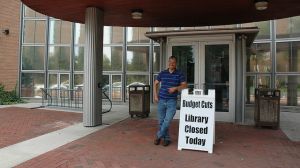
A library in Montclair, New Jersey, is closed due to budget cuts. (Image: Emily Mills/CC 2.0)
Behind this sluggish recovery lies a vicious cycle: The crash led to mass layoffs and wiped out trillions in household wealth. That led to a huge drop in consumer spending, which created an “output gap” — an economy working at less than full capacity — that persists today. State tax revenues were decimated, and many states responded by cutting their budgets, which led to more layoffs and fewer tax dollars coming in even as pressure on various social welfare programs increased.
Since the recovery began in 2009, a lopsided share of the country’s income gains have gone to the wealthiest households. And in Monday’s Washington Post, Josh Boak reports that a new study by Standard & Poor’s finds that the resulting increase in inequality is also taking a toll on state budgets.
Boak writes:
The widening gap between the wealthiest Americans and everyone else has been matched by a slowdown in state tax revenue, according to a report being released Monday by Standard & Poor’s.
Even as income has accelerated for the affluent, it has barely kept pace with inflation for most other people. That trend can mean a double whammy for states: The wealthy often manage to shield much of their income from taxes. And they tend to spend less of it than others do, thereby limiting sales tax revenue.
As the growth of tax revenue has slowed, states have faced tensions over whether to raise taxes or cut spending to balance their budgets as required by law.
“Rising income inequality is not just a social issue,” said Gabriel Petek, the S&P credit analyst who wrote the report. “It presents a very significant set of challenges for the policymakers.”
Stagnant pay for most people has compounded the pressure on states to preserve funding for education, highways and social programs such as Medicaid. The investments in education and infrastructure also have fueled economic growth. Yet they’re at risk without a strong flow of tax revenue.
The prospect of raising taxes to balance a state budget is a politically delicate one. States have used the allure of low taxes to spur job creation by attracting factories, businesses and corporate headquarters.
Other factors also come into play in states’ budget woes. For more of the story, read the rest of the piece at The Washington Post.
This work is licensed under a Creative Commons Attribution-NoDerivatives 4.0 International License.

